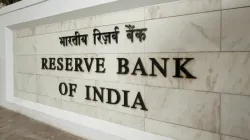RBI expresses optimism about Indian economy, gross NPA at 12-year low, GDP to grow at 6.6 per cent
The Reserve Bank of India has released its Financial Stability Report (FSR) expressing optimism about the economy in the near future. It also revealed facts about NPA, the condition of Scheduled Commercial banks and inflation.

The Reserve Bank of India on Monday said that the bank's asset quality improved further and their gross non-performing assets (GNPA) or bad loans ratio declined to a 12-year low of 2.6 per cent in September 2024. This is backed by falling slippages and steady credit demand.
In its Financial Stability Report (FSR), the RBI stated that the net NPA ratio ( the proportion of net non-performing assets in net loans and advances) was around 0.6 per cent. "Buoyed by falling slippages, higher write-offs and steady credit demand, the gross nonperforming assets (GNPA) ratio of 37 scheduled commercial banks (SCBs) fell to a multi-year low of 2.6 per cent," the report said.
The RBI also flagged concern over a sharp rise in write-offs, especially among private sector banks (PVBs), which could be partly masking worsening asset quality in unsecured lending segment and dilution in underwriting standards.
GDP to grow at 6.6 per cent
The report also said that India's GDP (gross domestic product) is expected to grow at a rate of 6.6 per cent in 2024-25. According to PTI news, it said that the country's GDP will be helped by improvement in rural consumption, acceleration in government consumption and investment and strong service exports.
On the nation economy, the RBI's FSR said that during the first half of 2024-25, real GDP growth (year-on-year) decelerated to 6 per cent from the 8. 2 per cent and 8. 1 per cent growth recorded during the first and second halves of 2023-24, respectively. The RBI said that despite this recent slowdown, structural growth drivers remain intact. Real GDP growth is expected to recover in the third and fourth quarters of 2024-25, supported by a pick-up in domestic drivers, primarily public consumption and investment, strong service exports and easy financial conditions."
RBI on Scheduled Commercial Banks, food inflation
According to the RBI the soundness of scheduled commercial banks (SCBs) is also strengthened by strong profitability, declining non-performing assets (NPAs) and adequate capital and liquidity buffers.
On inflation, the report said that going forward, food prices are expected to soften due to the disinflationary impact of bumper Kharif crop and Rabi crop prospects. Geopolitical conflicts and geoeconomic fragmentation could also put upside pressure on global supply chains and commodity prices.
(With inputs from agencies)